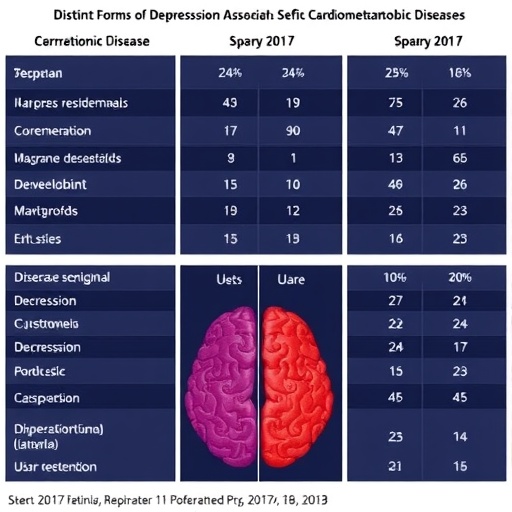Recent research presented at the 38th ECNP Congress in Amsterdam provides compelling evidence that the relationship between depression and cardiometabolic diseases is more nuanced than previously understood. In a landmark seven-year observational study involving 5,794 adults from the Netherlands Epidemiology of Obesity (NEO) Study, scientists demonstrated that distinct depressive symptom profiles confer varying risks for specific cardiometabolic conditions. This paradigm-shifting work sheds new light on the biological underpinnings linking mental health and physical disease, highlighting the urgent need for more precise approaches in psychiatric and metabolic health management.
At the outset of this extensive investigation, participants were thoroughly screened to ensure the absence of overt diabetes and cardiovascular disease, establishing a clear baseline for follow-up. Each individual completed a rigorous questionnaire designed to classify depressive symptoms into two primary types: melancholic and atypical/energy-related. Melancholic depression is characterized by classic symptoms such as early morning awakening and diminished appetite. In contrast, atypical or energy-related depression manifests with increased sleep, fatigue, and heightened appetite. This differentiation of depressive phenotypes was crucial to understanding the subsequent disease trajectories observed over the study period.
The study’s longitudinal design revealed that approximately 8% of participants developed cardiometabolic conditions during follow-up. However, the type of depression they exhibited at baseline significantly predicted the nature of the metabolic or cardiovascular disease they later developed. Individuals exhibiting atypical/energy-related depressive symptoms were nearly 2.7 times more likely to develop Type 2 diabetes when compared with their non-depressed counterparts. Notably, this subgroup did not exhibit a statistically significant increase in cardiovascular disease risk, indicating a metabolic specificity linked with this depression subtype.
Conversely, participants with melancholic depressive symptoms were found to be 1.5 times more likely to develop cardiovascular diseases such as myocardial infarction or stroke in the ensuing years, with no notable increase in Type 2 diabetes incidence. This stark divergence underscores the heterogeneous biological pathways tethering depressive symptomatology to systemic disease outcomes. The distinct risk profiles beg deeper inquiry into the mechanistic underpinnings driving these disparate health trajectories.
Delving deeper into the biological substrates, lead investigator Dr. Yuri Milaneschi from Amsterdam UMC elucidated that participants with atypical depression exhibited significant disruptions within inflammatory and metabolic pathways most relevant to cardiometabolic health. Biomarkers indicative of systemic inflammation, insulin resistance, and altered lipid metabolism were notably elevated in this group. Intriguingly, these molecular signatures were absent in those with melancholic depression, suggesting unique biochemical milieus depending on the depressive subtype. This differentiation is pivotal for understanding how depression exerts integrative effects on physical health.
Dr. Milaneschi emphasized that this biological divergence between depression types strongly supports the emerging paradigm of precision psychiatry. He argued that mental illness must no longer be viewed through a one-size-fits-all lens but rather through the nuanced interplay between psychological symptoms and their physical health ramifications. “Our findings advocate strongly for integrated models of care that concurrently address mental and physical health, tailoring interventions based on the individual’s depressive phenotype,” Milaneschi noted. This perspective underscores a transformative shift towards individualized treatment strategies that holistically target both mind and body.
The implications of this research reverberate beyond scientific circles, highlighting critical healthcare policy considerations. Dr. Chiara Fabbri from the University of Bologna, who was not involved in the study, underscored the public health significance of integrating cardiometabolic disease prevention into the management of depression. With the global prevalence of chronic conditions like diabetes projected to increase markedly over the coming decades—especially within the European region—early diagnosis and intervention in vulnerable populations become paramount. “Depressed individuals represent a high-risk cohort for physical illness, and our approach to their care must evolve accordingly,” Dr. Fabbri remarked.
This study also paves the way for future research targeting the molecular mechanisms linking specific depressive symptoms with metabolic and cardiovascular dysregulation. Unraveling how neuroinflammatory processes and metabolic derangements intersect with mood disturbances could identify novel therapeutic targets. Furthermore, recognizing depression as a heterogeneous disorder with distinct systemic repercussions may refine clinical trial design, leading to more stratified and effective treatments.
Importantly, the NEO study’s large sample size and considerable follow-up duration lend robustness to these findings. The observational design, although limited in establishing causality, offers valuable real-world insights into the longitudinal progression from depression to physical illness. Researchers caution that these findings will need replication and validation across different populations and ethnic groups to ensure broad applicability.
Clinicians treating depressed patients may soon be equipped to stratify cardiometabolic risk based on an individual’s depressive symptom profile. Such precision diagnostics could transform existing psychiatric practice, introducing routine metabolic screenings tailored to symptomatology to preempt the emergence of diabetes or cardiovascular disease. This approach underscores an integrated biopsychosocial model prioritizing preventative care.
In conclusion, this groundbreaking research elucidates that depression is not monolithic in its physical health consequences; instead, its subtypes portend specific cardiometabolic risk profiles. By harnessing this knowledge, psychiatry stands poised to embrace a precision medicine framework, effectively bridging the divide between mental and physical healthcare. As burgeoning evidence aligns, future strategies may prioritize biomarker-driven diagnoses and personalized interventions, heralding a new era in the treatment of depression and its associated systemic diseases.
Subject of Research: People
Article Title: Not specified
News Publication Date: Not specified
Web References: Not specified
References: Not specified
Image Credits: Not specified
Keywords: Mental health, Cardiology, Metabolic disorders, Type 2 diabetes, Affective disorders, Depression, Psychiatry




